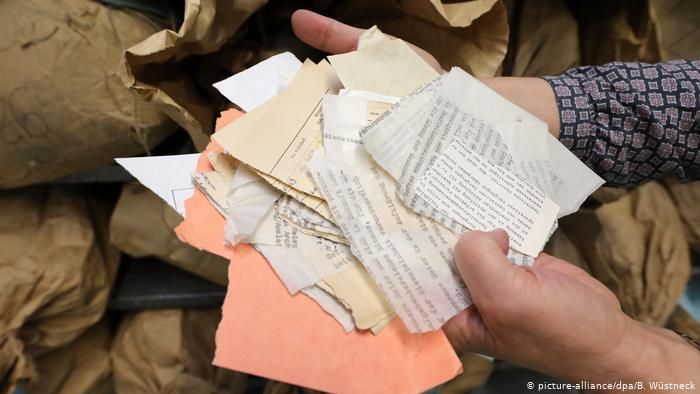
來自太巴塱部落的阿美族人,2009 年到荷蘭萊頓大學從事十七世紀台灣史研究,之後定居荷蘭。目前以翻譯、寫作、研究為主業,並參與國際原住民族運動。曾獲 2017 年台灣文學獎原住民短篇小說獎。已出版小說有《絕島之咒》,翻譯專書有《地球寫了四十億年的日記》、《西班牙人的台灣體驗》、《故道》等。
Pandora's Archives No. 8|The former East German secret police archives and the fading memories of pain (Let Love Power Season 2)
At the beginning of last year, Dutch newspapers discussed the transfer of the card files of Jewish victims to the National Archives . The public opinions were divided, and there were many critics. Even our professor of archives, Yan Pingshi, believes that from the archives management profession and responding to social needs, the For perspective, there are other institutions better suited to receive victim card files than the National Archives in The Hague. A similar situation is now occurring in Germany. The latest re-emergence of German public opinion is the transfer of the Stasi Unterlagen files , the files of the former East German secret police.
This time we will focus on<br class="smart">What is the Stasi File?
Doubts caused by the transfer of the Stasi archives Stasi archives and inspiration for the creation of pain

What is the Stasi Archive?
Stasi is a derogatory acronym for the East German Ministry of State Security (Ministerium für Sta ats si cherheit ⇧), whose official abbreviation is MfS. This is a secret police agency established on February 8, 1950 and disbanded during the peaceful reunification of the two Germanys on October 4, 1990, and the so-called Stasi archives are the remains of the East German secret police activities during these forty years. All records. When the two Germanys were reunified, thanks to the efforts of relevant people, this large amount of "shady" data was not destroyed (but some were destroyed), and the merged Germany and the establishment of Stasi specializing in the management of the Stasi archives Western Archives (BStU). This year is the 31st and last year of the establishment of the Stasi Archives, because the German Federal Parliament decided in September 2019 that the Stasi archives must be handed over to the Bundesarchiv within two years , and the task will be completed by then The Stasi Archives will also be officially disbanded. Two years have passed in the turbulent international situation, and this summer is the deadline for the Stasi Archives to withdraw from the stage of history.
⇩ During the reunification of the two Germanys, the secret police tried to destroy the archives, and there are still many such fragments in the Stasi archives.

How big is the archive of the former East German secret police? If all the archives (mainly documents, but also audio and video) are arranged end to end, they can be arranged from the Taipei section of National Highway No. 1 (25km) to the Miaoli section (132km), with a total length of 111 kilometers, which is very huge and amazing. In terms of scale, in addition to the secret police of the year, there were also East German residents who informed each other. Since the reunification of the two Germanys, the Stasi Archives has received a total of more than 7.35 million requests to read files, of which 46% came from former East German residents. Many wondered how much the secret police knew about themselves - did the secret police know the details of my private life? Do they know my political leanings? Any idea how I plan to escape East Germany?
However, the Stasi's scope of activities is not only in the former East Germany, so over the years, the Stasi Archives has also received many requests for file reading from West Germans, accounting for more than seven million requests. 12%, in addition to a whopping 21,000 requests from more than 100 countries around the world, possibly by ex-East German residents who immigrated to other countries.
It is easy to understand how people want to read the archives. No matter how cruel the past and the unbearable memories are, they are the years of life that every experiencer will never come back to. Those who are lucky enough to survive the hard times will always look back. It is time to draw hope and courage from the pain of the past. After all, it is often not the light itself that drives people towards the light, but the darkness that everyone wants to escape from.
Doubts over Stasi file transfer
As the transfer deadline approached, German public opinion began to pay attention to the problems after the Federal Archives took over the Stahita case. From the perspective of relevant laws and regulations, the public's access to the Stasi archives in the future will not be affected by the change of the administrative authority, but the laws themselves cannot dispel the doubts of the society.
If there are no obstacles in the law, then what are you worried about? Archivist Yan Pingshi believes that what people do not trust may not be the archival institution, but the country itself. In the Netherlands, there is a precedent for Jewish people to transfer victim card files to the National Archives for comparison. Specifically, people may be concerned about how much manpower and resources the Federal Archives can use for the Stasi archives after the originally independent Stasi Archives are merged into the larger German Federal Archives? Even if scholars, the media, and victims of the former communist regime still have the legal right to access the archives, does the fact that the archives are managed by the Federal Archives itself makes the practical work more troublesome?
There is also the symbolism of the consolidation of the Stasi archives and their entry into the federal archives. Perhaps for the German Confederation, the scourge of communism is a thing of the past, and it can be locked into the archives without pain, but for every victim of the former East German secret police, the traumatized life continues. "It's over" is an unbearable light. Perhaps at this moment on the eve of the file transfer, many doubts from all walks of life are based on this.
⇩ Russian President Vladimir Putin's Stasi document is one of the most well-known documents revealed by the Stasi archives. Although the outside world generally believes that Putin is a member of the former East German secret police, a spokesman for the Stasi Archives said that this should be the document Putin used to enter the Stasi-related measures, and does not mean that Putin himself is a secret police.

Be it the Jewish Parliament Victim Card Archives in the Netherlands or the Stasi Archives in Germany, the controversy over the transfer of archives always revolves around living people and their memories too painful to forget. It’s as if three quarters of a century have passed since the end of World War II. For many Europeans, the Nazis and the Holocaust are far away, but in Israel, Wagner’s music is still taboo, because Hitler wishful thinking Gerner's music is the gateway to understanding National Socialism. Just one year before the German Federal Parliament made the decision to transfer the files, a classical music radio station in Israel suddenly broadcast an excerpt from the last act of Wagner's opera "Ragnarok". to the Nazis, to Wagner to Wagner. However, the music stopped after a few minutes, followed by a dead silence. This is a moment when the silent is better than the sound, speaking of the tenacious life of the pain itself. Legend has it that when the Nazi concentration camps sent Jews to the gas chambers, Wagner's music was always played. Who knows if there was someone listening to the music on the day Wagner was suddenly played on the radio station, and in that dead silence, they learned the legend. The atmosphere of the gas chamber?
⇩ Barron Boeing conducts the Paris Orchestra in the finale of Wagner's Ragnarok (1982)
Richard Wagner, Götterdämmerung , Finale
Orchestre de Paris, dir. Daniel Barenboim
The Stasi Archives and Inspiration for the Creation of Pain
While the news of the transfer of the Stacita case was being discussed in the German newspapers, I was talking about creations based on historical atmospheres with Yan Plushi, and we introduced each other to some works, including Japanese manga artist Naoki Urasawa's "Monster". This comic may not be unfamiliar to Taiwanese readers. The activities of the former East German secret police are the nutrient for terror, nourishing twins who are beautiful but struggling with human nature, and also push the life-saving doctor to the road of no return as a killer. Stripped of all the plots, "Monster" and Orwell's famous "Nineteen Eighty-Four" are not fundamentally different. Both question the totalitarian distortion of human nature and try to explore the scale and depth of that distortion.
In Nineteen Eighty-Four, published in 1949, Orwell wrote in the shadow of Soviet expansion, and he made it clear that he wrote this dystopian novel by imagining Britain falling under Soviet rule. In contrast, the "Monster" serialized from 1994 to 2001 does not seem to be threatened by totalitarianism. It may be considered that East Asian creators reminisce about the past of Central Europe, but it cannot be understood as the embrace of the Japanese in the face of a huge totalitarian China. of vague apprehension.

After listening to the narration of "Monster", Yan Plushi said that he could empathize with why the cartoonist tried to use the image of a beautiful young man to outline the horror. He mentions Vladimir Putin, now the owner of the Kremlin, who reigns in Moscow as tsar under a democratically elected system. As a Western European, Yan Plover always rises up whenever he sees Putin showing up with a fresh bouquet to show his gentlemanly demeanor when there are female guests (such as the wife of another head of state), or seeing him show humor and smile in front of reporters Some kind of horror. Many people love and support Putin, not because he loves freedom and human rights, but simply because of his superficial demeanor. In Yan Plough's eyes, this is a landscape that is almost terrifying, but it is also such a horror that keeps awake people awake.
"The sadness of our age is that there is nothing that can be firmly grasped," commented Yan Pluish. "Maybe we can say, to a certain extent, that we have lost faith without knowing it. It’s understandable to have a tragic past to maintain our essence as a human being, but we also feel a little sad when we understand it.”
As an archivist and historian, Yan Plover is more concerned with the day in the future - when all the victims of the former East German secret police are deceased, when all those who have direct memory of hearing are deceased, the Stasi Archives When it truly enters history, even the voice of doubt and anxiety will cease to exist. At that time, can we still learn from the 111 kilometers of archives?
⇩ The German Federal Archives, which will receive the Stasi Archives this summer.

Like my work?
Don't forget to support or like, so I know you are with me..
Comment…